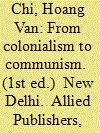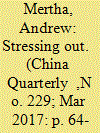| Srl | Item |
| 1 |
ID:
140754


|
|
|
|
|
| Edition |
1st ed.
|
| Publication |
New Delhi, Allied Publishers, 1964.
|
| Description |
xv, 210p.hbk
|
|
|
|
|
|
|
|
|
|
|
|
Copies: C:1/I:0,R:0,Q:0
Circulation
| Accession# | Call# | Current Location | Status | Policy | Location |
| 000004 | 959.704331/CHI 000004 | Main | On Shelf | General | |
|
|
|
|
| 2 |
ID:
151577


|
|
|
|
|
| Summary/Abstract |
Might authoritarian one-party systems experience something akin to party identification – or affective proximity to the Party – that waxes and wanes over time? Such cycles do not centre on elections but on the politics of succession, new policy initiatives and ad hoc housecleaning, and their focus would be officials within the system as opposed to the electorate outside it. I argue that a key mechanism animating such variation in party identification of Chinese Communist Party (CCP) cadres lies within the recurring rectification efforts seeking to temper these individuals and make them more submissive to the larger political goals of the Party centre. Such priming is largely an in-house phenomenon, taking place increasingly deeper within the CCP apparatus. This process tends to involve an extensive arsenal of institutional mechanisms that constitute a particularly big stick and within which pressures to comply can be uncomfortable, even excruciating. Normative elements of these movements, such as the language and substantive written materials used during study, analysis and self-criticism are predominantly in the service of enhancing the sheer domineering quality of the Party vis-à-vis the individuals that make up its ranks. I explore this through an examination of the three stresses (san jiang) campaign of 1998–2002.
|
|
|
|
|
|
|
|
|
|
|
|
|
|
|
|